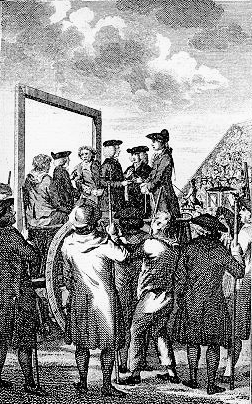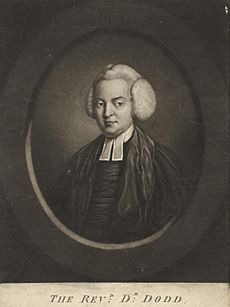William Dodd (priest) facts for kids
Quick facts for kids
William Dodd
|
|
|---|---|

William Dodd at the place of execution at Tyburn.
|
|
| Born | 29 May 1729 Bourne, Lincolnshire, England
|
| Died | 27 June 1777 (aged 48) Tyburn, London, England
|
| Occupation | British writer and clergyman, hanged for forgery |
William Dodd (born May 29, 1729 – died June 27, 1777) was an English Anglican priest and a writer. He was known for living a very fancy lifestyle. This earned him the nickname "Macaroni Parson".
He got into serious debt and tried to solve his money problems by forging a document. This led to his arrest and conviction. Even though many people, including the famous writer Samuel Johnson, tried to help him get a pardon, he was hanged for his crime in Tyburn.
Contents
William Dodd's Life Story
Early Life and Education
William Dodd was born in Bourne, England. His father was the local priest, also called a vicar. William went to Clare Hall at the University of Cambridge. He studied there from 1745 to 1750.
He was a very good student and graduated with high honors. After finishing college, he moved to London. However, he quickly spent too much money and got into debt. On April 15, 1751, he married Mary Perkins. This made his money problems even worse.
Becoming a Priest
William's father was worried about his son's choices. He encouraged William to become a priest. So, William decided to join the church. He became a deacon in 1751 and a priest in 1753.
He worked as a curate in West Ham and later preached in other London churches. William became a very popular speaker. People enjoyed his sermons. In 1763, he was even chosen to be a special chaplain to the King.
He also taught Philip Stanhope, who later became the 5th Earl of Chesterfield. In 1766, he earned a special degree from Cambridge University. After winning £1,000 in a lottery, he invested in building chapels. Despite his religious job, he kept living a very expensive life. This is why he was called the "macaroni parson." In 1772, he became a rector in Hockliffe and a vicar in Chalgrave.
Financial Troubles and Scandal
By 1774, William Dodd was in deep financial trouble again. He tried to get a very well-paid job as a rector in London. He sent an anonymous letter to the wife of a powerful judge. In the letter, he offered her £3,000 if she could help him get the job.
The letter was traced back to Dodd. Because of this, he lost all his church positions. He became a laughingstock and was even made fun of in a play. To escape the scandal, he left England for two years. He traveled in Europe before returning in 1776.
Forgery and Execution
In February 1777, William Dodd committed a serious crime. He forged a document for £4,200. He used the name of his former student, the Earl of Chesterfield. He did this to pay off his many debts.
A banker accepted the forged document and lent Dodd money. Later, the banker noticed a small mistake on the paper. He asked for a new, clean copy. When the new copy was shown to the Earl, the forgery was discovered.
Dodd immediately admitted what he had done. He was put in prison and later found guilty. He was sentenced to death. Many people tried to save him. The famous writer Samuel Johnson wrote several letters to support him. About 23,000 people signed a petition asking for a pardon. However, despite these efforts, William Dodd was publicly hanged in Tyburn on June 27, 1777.
His Writings
William Dodd wrote several books and poems. His most famous work was The Beauties of Shakespeare (1752). In this book, he created a way to easily find parts of Shakespeare's plays, much like an index. He also wrote a Commentary on the Bible (1765–1770). While he was in Newgate Prison waiting for his execution, he wrote a poem called Thoughts in Prison.
A Famous Quote
Samuel Johnson, who tried to help Dodd, wrote a sermon for him. This sermon was called The Convict's Address to his unhappy Brethren. When someone doubted if Dodd really wrote it, Johnson made a famous remark. He said, "Depend upon it Sir, when a man knows he is to be hanged in a fortnight, it concentrates his mind wonderfully." This meant that facing such a serious situation makes a person focus very clearly.
 | Jessica Watkins |
 | Robert Henry Lawrence Jr. |
 | Mae Jemison |
 | Sian Proctor |
 | Guion Bluford |


